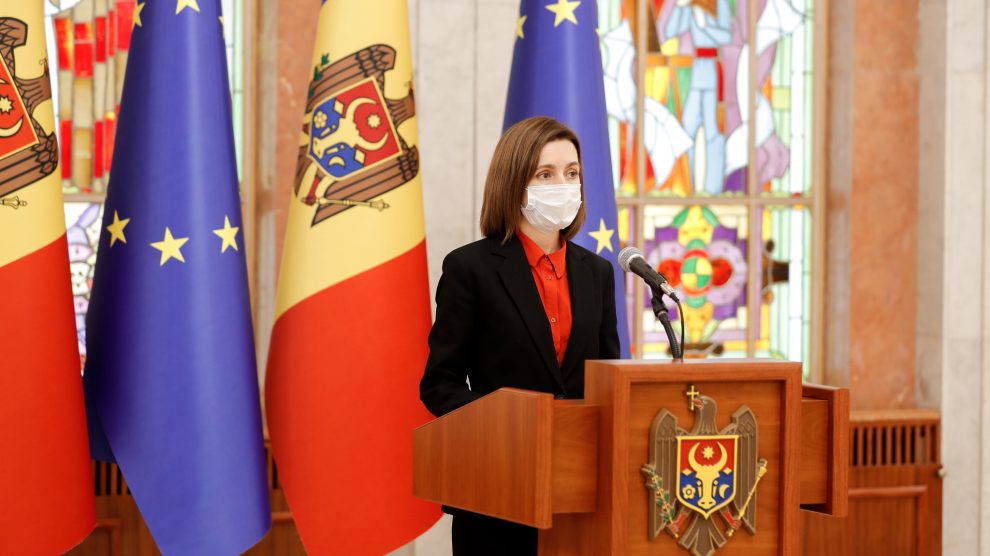Moldova took a step closer towards a snap election on April 15 when the country’s Constitutional Court ruled that President Maia Sandu is free to dissolve parliament. However, she will have to wait until May 31 – when the current state of emergency is due to end – before doing so.
Moldova’s Constitutional Court ruled on April 15 that the country’s president, Maia Sandu, is free to dissolve parliament and call a snap election.
The ruling follows a series of unsuccessful attempts by various parliamentary groupings to form a government.
“This is an important decision not just for constitutional justice in our country, but for the state of Moldova and its citizens,” said Sandu, who personally pleaded her case before the court.
“We have taken a major step towards giving Moldovans the opportunity to elect a parliament that truly represents them, and a government that will work in their best interests.”
- For Moldova, a fresh start
- Plight of anti-corruption chief is Maia Sandu’s first test as Moldova’s president
- Why it’s time to ditch the ‘pro-European’ and ‘pro-Russian’ epithets
The Harvard-educated president, erstwhile leader of the Action and Solidarity party (PAS), had been pushing for a new vote to end the country’s political impasse ever since she defeated the incumbent Igor Dodon, backed by the Moldovan Socialist party (PSRM), in a presidential election on November 15 last year.
However, Sandu may have to wait a little longer to get her wish: the Constitutional Court also ruled that parliament cannot be dissolved during a state of emergency.
Lawmakers voted to introduce a state of emergency for a period two months on March 31. The move was ostensibly to help the country control the spread of the Covid-19 pandemic, but has widely been viewed as a last-ditch attempt by Sandu’s opponents to block the dissolution of parliament and delay a new election further.
The legality of the state of the emergency has itself been called into question by Sandu and her supporters, however.
According to Moldova’s constitution, only a president or prime minister with “full powers” can ask parliament to pass state of emergency legislation. Moldova’s current prime minister, Aureliu Ciocoi, is merely an interim without such power.
Moldova has been without a formal prime minister since Ion Chicu resigned on December 23 last year, just hours before parliament was due to vote on a no-confidence motion, and only a day before Sandu took office.
Chicu’s government was a shaky coalition of two centre-left parties, the PSRM and the Democratic party, formerly led by the oligarch Vlad Plahotniuc, who is currently fighting extradition to Moldova from the US on corruption charges. The coalition – which took office in November 2019 – could count on the support of just 51 of Moldova’s 101 MPs.
It is now likely that the Constitutional Court will be asked to rule on whether or not the state of emergency is legal.
Until then, Moldova’s political parties are likely to begin making preparations for an election that now appears inevitable: only its timing is uncertain. Nevertheless, Dodon has already suggested that the PSRM will not recognise the Constitutional Court’s ruling, calling it “an illegitimate attempt to take power”.
Polls point to PAS majority
Long viewed by the international media, in somewhat simplistic terms, as “pro-European” (as opposed to Mr Dodon, who favours closer ties with Russia), Sandu centered her presidential campaign on eradicating poverty and fighting the corruption that has done so much damage to the economy of what remains Europe’s poorest country.
In October 2020, the Council of Europe’s anti-corruption body, GRECO, condemned Moldova for making little progress in the fight against high-level corruption, saying that measures taken in recent years were “clearly insufficient”.
Sandu has also pledged to renew Moldova’s European aspirations, although the make-up of Moldova’s current parliament is not in her favour.
PAS has just 15 seats, although the latest opinion polls suggest that it would be close to gaining an outright majority should an election be held, with support at an all-time high at close to 50 per cent.
Moldova is not scheduled to hold another parliamentary election until 2023, hence Ms Sandu’s desire to dissolve parliament and call an early vote.
Photo: Maia Sandu official Facebook page.
Unlike many news and information platforms, Emerging Europe is free to read, and always will be. There is no paywall here. We are independent, not affiliated with nor representing any political party or business organisation. We want the very best for emerging Europe, nothing more, nothing less. Your support will help us continue to spread the word about this amazing region.
You can contribute here. Thank you.



